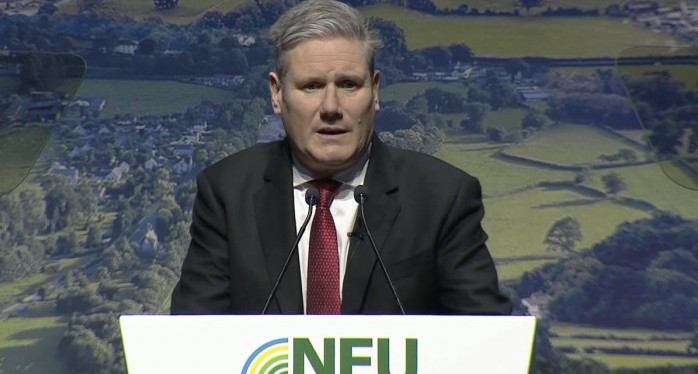Farming organisations from across the UK have expressed a desire to work with the new Labour government on key farming policy areas, after Sir Keir Starmer’s crushing election victory.
The expectation is that the shadow Labour Defra team, including Steve Reed as secretary of state and Daniel Zeichner as farming minister, will continue into government.
They will have a number of big farming issues to address, with the spotlight certain to fall on Labour’s approach to the farming budget.
Constructive relationship
The NPA has said it will continue to push hard on the key issues that matter for the pig sector, as the new Labour government takes office from today, following Sir Keir’s crushing election victory.
NPA chief executive Lizzie Wilson said: “We offer our wholehearted congratulations to Sir Keir Starmer on this historic election victory.”
The NPA’s manifesto set out three overarching priorities:
- A supply chain that works for all – including delivering effective regulation governing pig contracts
- Investment in Britain’s biosecurity – including investing properly in checks on illegal meat imports at the Port of Dover
- Protection for our world-leading animal health and welfare – including ensuring that any new regulation governing animal welfare on farms is developed and delivered with the industry’s needs in mind.
Mrs Wilson added: “There remains a number of challenges that we must continue working hard to overcome, not least the threat of African swine fever in Europe and the need to deliver fairness in the supply chain for our farmers.
“We look forward to continuing our close working relationship with Steve Reed and the Labour Defra team to jointly champion the British pig sector.”
Boosting national security
The NFU said it was looking forward to working with the new government to help deliver its missions for Britain by boosting national food security, contributing to economic growth and driving environmental benefits.
NFU president Tom Bradshaw said: “This is a reset moment for British agriculture as we work with Sir Keir Starmer’s new government to drive our sector forward and grow.
“Labour’s manifesto recognised that food security is national security, but it is business confidence which forms the foundation of this. With British farmers and growers ambitious for the future, what they – and the public – need are practical policies that revitalise farm business confidence and deliver on our shared mission of food security.
“In a cost-of-living crisis, our ability to provide affordable, climate-friendly and high-welfare food will be critical for families across the country, as well as underpinning the UK’s largest manufacturing sector, food and drink, and stimulating economic growth.
“That’s why, for Britain’s farmers, the number-one priority for the new Labour government must be to set an increased multi-year agriculture budget for the duration of the next parliament. This is about investing in the future of British farming – in home-grown food, in the environment and in renewable energy.
“In the coming days and weeks, we will be building on our strong engagement with Labour ministers to date to discuss essential policy solutions on key issues for our members.”
Another hot topic in the Defra team’s inbox could be bovine TB. Mr Bradshaw said: “Our members will also want to see the new government’s commitment to food security by being alert to the risk and impact of disease, particularly bovine TB, as we work towards the government’s target to eradicate this terrible disease by 2038.
“Working together on these immediate priorities is a win-win. The public will get more of the British food they know and love, farmers and growers will have the confidence to build profitable, sustainable, resilient businesses – supporting economic growth and environmental delivery – and this new government will help to secure a safe supply of home-grown food in an increasingly volatile and uncertain world.”
Meat industry
Tony Goodger, spokesperson for the Association of Independent Meat Suppliers (AIMS), set out some of the meat industry’s priorities, including access to Labour.
“The new Labour government has promised to ‘kickstart the economy’, stating in its manifesto that it ‘will publish a trade strategy and use every lever available to get UK businesses the access they need to international markets. This will promote the highest standards when it comes to food production’.
“It is essential that the meat and poultry processing industry have access to skilled and affordable labour, and we will continue, as before, to make the case with the Migration Advisory Committee and the Home Office.
“AIMS’ number one priority with respect to overseas trade is to restore frictionless movement of products of animal origin into mainland Europe, which we know can be easily achieved by establishing a veterinary agreement with the EU.
“It is also essential that the new government fully recognises that the food industry and its supply chains sit within the UK’s critical national infrastructure.
“We urge ministers across Whitehall to immediately take the opportunity to reclassify those ideologically driven individuals or groups that disrupt supply chains as no longer being ‘activists’, but treating them as ‘criminals’ and swiftly dealing with them through the courts.”
Scotland view
Scotland saw a huge shift in representation, with a resurgent Labour reducing the Scottish National Party to just nine seats.
NFU Scotland president Martin Kennedy said: “NFU Scotland has always worked constructively with whoever is in government in the best interests of Scottish farming and crofting.
“Successful farming and food sectors are at the very heart of the Scottish rural economy. Future agricultural and rural funding is key – an element that was not included in the Labour Party manifesto for this election.
“An immediate priority is securing a commitment from the new UK government on an increased, ring-fenced and multi-annual budget for farm support across the UK. That will enable farmers and crofters to invest, plan better and deliver the required outcomes that will be in the best interests of Scotland and the UK.”




